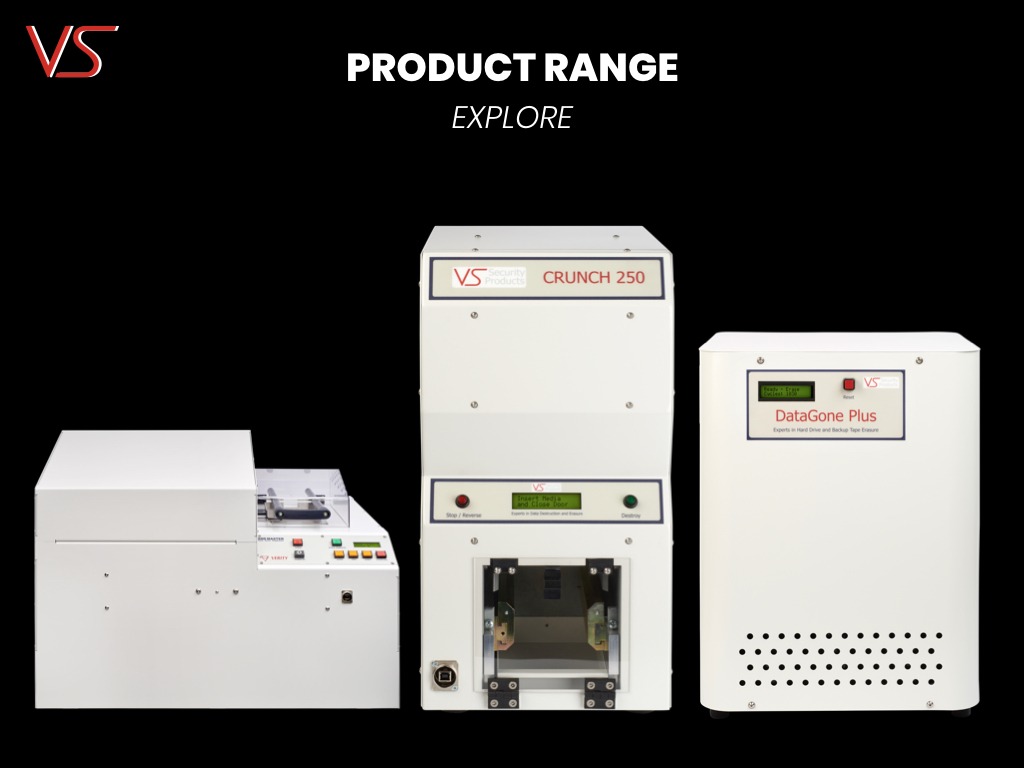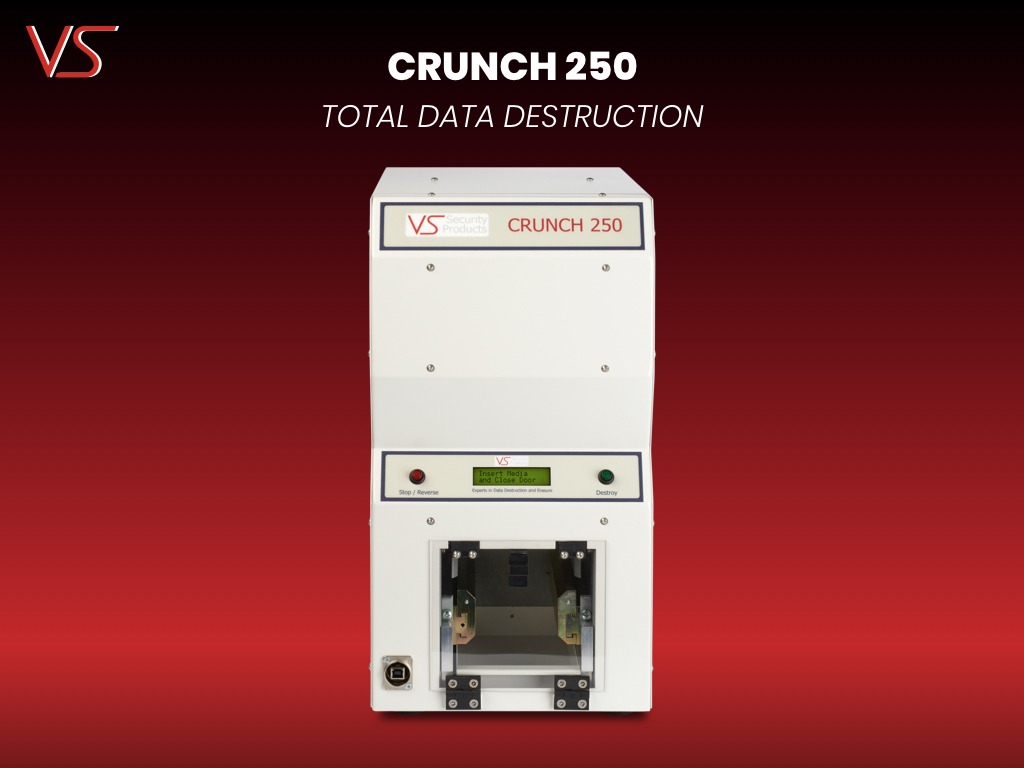Erase, Don’t Expose: 9 Case Studies in Secure Data Destruction

From hospitals and banks to design firms, manufacturing plants, and government agencies, hard drives house critical information essential for most operations. But what happens when this data reaches its end-of-life? Simply discarding used hard drives poses a significant security risk.
Explore below various scenarios for different businesses that are approaching this dilemma and what they can do:
- The government agency upgrading network infrastructure
A government agency upgrades its network infrastructure, replacing outdated servers with newer, more secure models. This upgrade process leads to a significant number of used hard drives no longer being used that contain sensitive government data, classified documents, and national security information. Improper disposal of these hard drives could have catastrophic consequences.
The solution: The government agency follows a strict data destruction protocol for all sensitive electronic media. They utilize a combination of in-house data sanitization tools and specialized services from pre-vetted data destruction vendors with high-security clearances. The data sanitization process involves degaussing with high gauss fields and physical destruction techniques for classified information, ensuring absolute data eradication from the hard drives. Additionally, the agency maintains a meticulous chain of custody record for all decommissioned hard drives, guaranteeing accountability and compliance with government security regulations.
- The hospital undergoing a digital transformation
A hospital undergoes a digital transformation, migrating patient records to a centralized electronic health record (EHR) system. This transition leaves them with a mountain of old hard drives from decommissioned computers that previously housed patient medical records, x-ray scans, and other sensitive health data. HIPAA (Health Insurance Portability and Accountability Act) regulations mandate the secure disposal of such information.
The solution: The hospital works with a data destruction company that specializes in HIPAA-compliant data sanitization. These companies understand the specific regulations governing healthcare data and offer solutions that meet strict compliance standards. The chosen service provider utilizes a combination of hard drive degaussing and physical destruction techniques to ensure complete data eradication from the hard drives. Additionally, the company provides a detailed audit trail documenting the chain of custody for the hard drives, from the point of collection to the final destruction process, ensuring accountability and compliance with HIPAA regulations.
- University going through a hardware update
A university undergoes a hardware refresh of its faculty computers. These decommissioned computers contain research data, student assignments, and even faculty intellectual property stored on hard drives. While the university maintains secure backups of academic data, the old hard drives themselves remain a security concern. Disposing of them without proper sanitization could lead to a data breach, exposing sensitive research findings or student information.
The solution: The university establishes a partnership with a data destruction service provider specializing in secure hard drive erasure for educational institutions. The chosen service offers a range of data wiping options, including onsite and offsite sanitization, catering to the diverse needs of the university’s departments. The university implements a policy mandating all decommissioned computers undergo data destruction before disposal, ensuring compliance with data privacy regulations and protecting sensitive academic information.
- The banking giant overhauling its IT systems
A major bank undergoes data center consolidation, migrating sensitive financial data and customer information to a new, state-of-the-art facility. This process leaves behind a collection of decommissioned servers containing hard drives with account details, transaction logs, and even internal banking applications. Failing to erase data from these hard drives before disposal could lead to a significant security breach, exposing customer financial information and potentially impacting the bank’s reputation.
The solution: The bank prioritizes data security by adhering to rigorous data destruction protocols. They implement on-site hard drive sanitization and data destruction, using data degaussers, destroyers, and shredders to securely erase and dispose of the old hard drives. For data compliance, they also implement a certification process to ensure that each hard drive is categorized, audited, and goes through the correct destruction process before it is disposed of.
- The manufacturer going through a plant upgrade
A manufacturing plant undergoes a production line overhaul. As part of the upgrade, they replace outdated control systems with newer, more efficient ones. These old control systems rely on hard drives to store production data, machine settings, and even proprietary manufacturing algorithms. Disposing of the hard drives without proper sanitization can expose this sensitive information to potential competitors or industrial espionage attempts.
The solution: The manufacturing plant partners with a data destruction service provider with expertise in secure hard drive degaussing. Degaussing uses powerful magnetic fields to permanently erase data from hard drives. The provider offers secure transportation of the drives to their facility, where they are subjected to degaussing in a controlled environment. Following the process, the provider furnishes a certificate of degaussing, guaranteeing complete data erasure from the hard drives.
- A law firm with historic case files
A law firm accumulates a vast collection of case files and client documents stored on hard drives from previous years. Due to ethical and legal requirements, they must retain this data for a specific period. However, with limited storage space and the need to ensure data security, the firm needs a secure solution to dispose of old hard drives once the retention period ends.
The solution: The law firm invests in a commercially available hard drive destroyer to safely dispose of all its old hard drives. This allows them to process multiple hard drives in a short period of time in the office. The firm establishes a protocol for documenting the data destruction process for each hard drive, ensuring complete accountability and compliance with data privacy regulations.
- The e-commerce platform upgrading servers
An e-commerce platform regularly upgrades its server infrastructure to meet the demands of growing customer traffic. These server upgrades result in a pile of old hard drives containing customer account information, purchase history, and even payment details. While they back up essential data to a secure cloud server, the old hard drives pose a significant security risk if not properly wiped before disposal.
The solution: The e-commerce platform hires a data destruction company that offers physically destructive methods for hard drives. These methods involve dismantling, crushing the hard drives, and physically destroying the platters, ensuring complete data obliteration. The company provides certified destruction certificates with an approved operator as an added layer of security, where a representative from the platform observes the shredding process to provide a final, comprehensive audit trail and report.
- A media company with legacy client data
A media production company accumulates hard drives from completed projects. These drives contain raw footage, edited video files, and even audio recordings of interviews or confidential company meetings. Leaking such sensitive data can be devastating for the company’s reputation and client relationships. Simply deleting the files is not enough, as sophisticated data recovery techniques could potentially extract the information.
The solution: The media production company chooses an on-site data destruction service specializing in secure hard drive sanitization for the entertainment industry. These services understand the specific needs of media companies and offer a range of data wiping techniques, including hard drive degaussing and shredding, to ensure complete data eradication. The company provides a detailed report documenting the chosen sanitization method and the specific destruction method used for each hard drive, guaranteeing complete data security.
- The design firm decommissioning old equipment
A design firm upgrades its computer workstations, replacing older models with machines boasting larger storage capacities. However, the decommissioned computers have hard drives containing sensitive design files, client information, and even intellectual property in the form of product prototypes. While the firm backs up essential data to a secure cloud server, the old hard drives themselves remain a vulnerability.
The solution: The design firm enlists the services of a data destruction company specializing in secure hard drive sanitization. The company offers both on-site and off-site data wiping options. After verifying the service adheres to industry standards, the firm chooses on-site sanitization for maximum control. Technicians visit the office and utilize specialized tools that erase the hard drives, rendering any existing information completely unrecoverable. The company issues a certificate of destruction, documenting the process and ensuring data eradication.
–
These various scenarios indicate how data destruction can be implemented for businesses and organizations in various industries. Whether choosing to outsource data destruction to a service provider, or building the capability in the business, there are numerous solutions that can help make this process easier, and more streamlined.
Contact us today to learn more about the most appropriate data destruction equipment you can use for your organization: [email protected]
Photo credit: Cherrydeck


